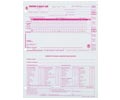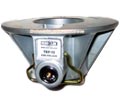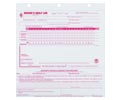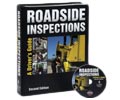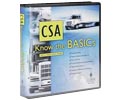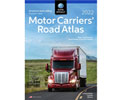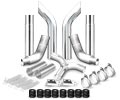Hours of Service Training - USB Program
Easily understand the New Hours of Service Rules and Regulations with this Training Program. It includes the four new rule changes that will improve safety, increase productivity, and increase flexibility for truck drivers.
The U.S. Department of Transportation's Federal Motor Carrier Safety Administration (FMCSA) has issued four significant Hours of Service (HOS) rule changes for interstate drivers – effective September 29, 2020.
The new Hours of Service Training program provides drivers with a thorough explanation of the Hours of Service Regulations, including how the rules help improve their safety and productivity.:
- Regs Covered: 49 CFR Part 395
- Ready-to-use training program includes several components
- English & Spanish available all in one program
- Closed-captioned for the hearing impaired
What’s Included
- (1) Full Video Program on USB - Combines engaging video and editing technology with expertise from industry professionals at all levels. Available in English & Spanish all in one program. Divided into six training modules:
- Basics
- Who is Regulated?
- Purpose of the Hours-of-Service Regulations
- Working Time
- Your Impact on Hours-of-Service CSA BASIC Score
- Limits
- Ill or Fatigued Operator
- 10-Hour Clock (Off-Duty)
- 14-Hour (On-Duty) Limit
- 11-Hour (Driving) Limit
- 60- and 70-Hour (On-Duty) Limit
- Interruption of Driving
- 34-Hour Restart
- Recording Your Hours
- Trip Planning
- Coercion of Drivers Prohibited
- Supporting Documents
- Recording Duty Status
- Roadside Inspections Expectations
- Exceptions
- Air-Mile Radius Short-Haul
- 16-Hour (“Big Day” Exception)
- Split-Sleeper Berth
- Adverse Driving Conditions
- Electronic Logging Devices (ELDs)
- Oil Field
- Agricultural Operations
- Utility Service Vehicles
- Personal Conveyance
- Other Exceptions
- ELD Basics
- ELD Use
- Driver ELD Expectations
- Harassment Prevention
- How to Complete a Manual Log
- Driver’s Manual Log
- Record of Duty Status
- Basics
- (1) Trainer Guide - Provides basic information and guidelines trainers need to present Hours of Service training. Trainer Guides are provided in the following languages and formats:
- English
- 1 printed copy (not sold separately)
- 1 PDF (on the USB)
- Spanish
- 1 PDF (on the USB)
- English
- (11) Driver Handbooks - 10 English (Product Code: 61361) and 1 Spanish (Product Code: 61362) - Provide a full-color, portable, easy-to-understand reference to be used during and after training. Review key points and includes quizzes to check employees’ understanding of the material.
- (2) Awareness Posters - 1 English printed copy and 1 Spanish printed copy - A full-color, photo-based reminder to help driver be compliant with the Hours of Service rules
- Trainer Tools on USB:
- Video Program*
- PowerPoint® presentations*
- Trainer Guides*
- Learning Activities with Answer Keys*
- Quizzes with Answer Keys*
- Photos
- Training Log
- Certificate of Completion*
- Awareness Poster*
What's Covered
- After completing Module 1: Basics, drivers will be able to:
- Identify who the hours-of-service regulations apply to
- Recognize the purpose of the hours-of-service regulations
- Differentiate between on-duty and off-duty activities
- Explain how hours-of-service violations affect driver and carrier CSA scores
- After completing Module 2: Limits, drivers will be able to:
- Recognize how fatigue requires drivers to stop driving even if they have hours left to legally operate
- Identify off-duty activities that qualify as a 10-hour break
- Describe how the 14-hour limit is calculated
- Identify which duty status the 11-hour limit tracks
- Determine when to use the 60- or 70-hour limit
- Identify an exception which resets the 60- or 70-hour limit
- Explain how to satisfy the 30-minute break required under the interruption of driving provision
- Differentiate between cumulative and consecutive limits
- After completing Module 3: Recording Your Hours, drivers will be able to:
- Describe how to use trip planning to achieve successful time management
- Identify two important components of coercion
- Explain how supporting documents are used to validate recorded hours
- Explain when to keep track of your hours using an ELD, manual log, or time record
- Recognize how roadside inspection expectations differ between ELDs, manual logs, and time records
- After completing Module 4: Exceptions, drivers will be able to:
- Identify which drivers can use an hours-of-service exception
- Describe what an exception relieves a driver from
- After completing Module 5: ELD Basics, drivers will be able to:
- Discuss when drivers are required to use an ELD
- Identify the five items required to be in the cab when recording hours with an ELD
- Describe how drivers can reduce unassigned drive time
- Explain the process to follow when their ELD malfunctions
- Differentiate between coercion and harassment
- After completing Module 6: How to Fill Out Manual Logs, drivers will be able to:
- Identify required fields on a manual log
- Prepare a record of duty status using a manual log
- Describe how to complete a recap to determine the number of hours a driver has available before hitting the 60- or 70-hour limit
4 New Rule Changes:
- 30-minute breaks (§395.3(a)(3)):
- Drivers can remain "on duty" for their breaks and not have to take a break until completing eight hours of driving time, rather than consecutive time.
- 100 air-mile exception (§395.1(e)(1))
- Drivers must be done working within 14 consecutive hours. Drivers must remain within a 150 air-mile radius.
- Split-sleeper provision (§395.1(g)(1))
- Drivers must spend at least 7 hours in a sleeper berth, plus another break to reach 10 hours total. Neither rest period counts against the 14-hour limit.
- Adverse conditions (§395.1(b)(1))
- Drivers may extend both their driving and on-duty limits by 2 hours.The new Hours of Service Training program provides drivers with a thorough explanation of the Hours of Service Regulations, including how the rules help improve their safety and productivity.
Back to Top
Comprehensive Safety Analysis (CSA)
Training Main Page




